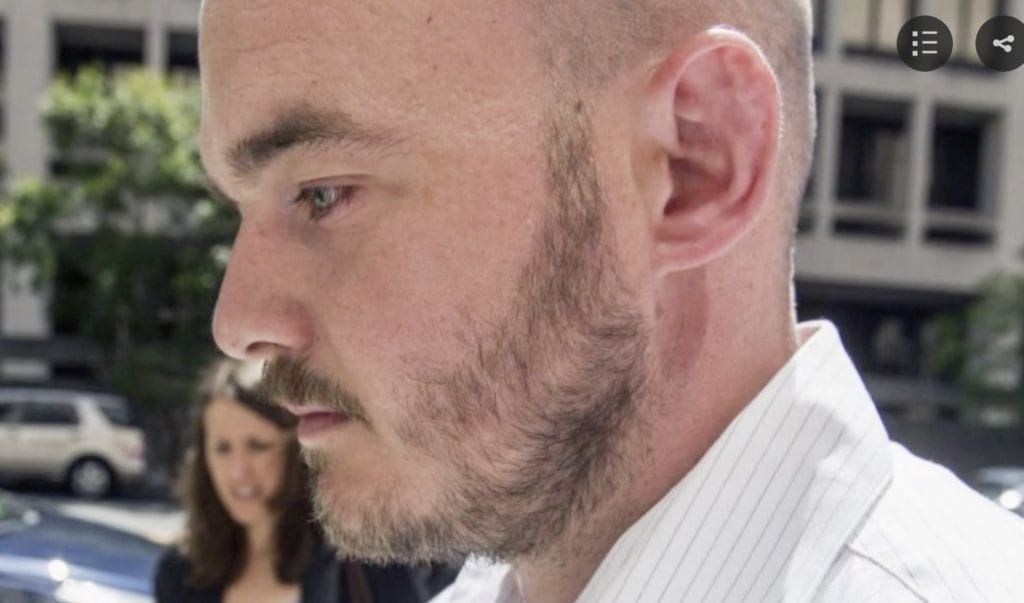In September 2018, I reported on the tortured legal history behind the prosecution of Nick Slatten and the Blackwater Raven 23 team.
He and several others were prosecuted multiple times, and eventually had sentences thrown out but were still kept in prison. The Department of Justice prosecutors were accused of misconduct numerous times.
Below is a transcript of that 2018 report with a link to the video at the end.
It seems every military conflict has its own tragic version of innocent civilians killed wrongly in the heat of war. In Iraq, there was the Nisour Square shootings in 2007. One of the accused, a decorated former U.S. soldier, was on trial just last week eleven years after the incident. In fact, the lives of four decorated former US soldiers still hang in the balance after all this time. Were their actions in legitimate self defense..or criminal acts? And did our own government suppress or misrepresent evidence? That’s today’s cover story: the case of Raven 23.
The logical place to begin is in Iraq— at the time, one of the most dangerous places on the planet. After the 9/11 attacks, U.S. forces deposed dictator Saddam Hussein — then faced a constant barrage from Islamic extremist terrorists and insurgents. On September 16, 2007 there was a deadly clash in the capital of Baghdad. A team of former US military troops code named “Raven 23” were working for the private firm, Blackwater, when they reportedly opened fire on innocent civilians. The episode heightened tensions between Iraq and the US— and the FBI stepped in to investigate. It concluded the Blackwater contractors “unleashed powerful sniper fire, machine guns, and grenade launchers on innocent men, women, and children” shooting at least 14 “without cause.” Including two boys ages 9 and 11. But like most stories—there are at least two sides. Erik Prince was Blackwater’s founder.
Erik Prince: This is the story of American military veterans who answered the call again when their country needed them— this time to protect diplomats— in a very large scale, in a war zone. And it is their political prosecution that followed an unfortunate incident in the middle of a war zone after multiple enemy attacks.
Prince, a former Navy SEAL, made Blackwater an integral part of U.S. overseas security after Islamic extremist terrorists bombed the USS Cole in 2000— murdering 17 sailors. Blackwater was hired to train our sailors in counterterrorism. In 2004, Iraqi insurgents killed four Blackwater contractors, set their bodies on fire, dragged them through the streets and hung them from a bridge.
Sharyl: What was the claim from the other side? What did they say that your guys had done wrong?
Erik Prince: And it was a bad firing that there was all these innocent civilians that were killed.
In fact, to this day, media accounts make it sound as if the “Blackwater guards” randomly “open(ed) fire” on Iraqi civilians— unprovoked and for no reason. But Prince says that sorely lacks context: the Raven 23 team thought it had come under ambush trying to escort the US official to safety.
Erik Prince: A car bomb had gone off. And the support team, Raven 23 was to block the traffic circles so the fleeing vehicles can move through there, uh, smoothly. All the vehicle stopped except for one which kept coming and coming and coming. It was a white Kia.
The Blackwater team reported the white Kia was driving straight at the convoy like a suicide bomber. When it kept going despite verbal orders and hand signals to stop, at least one Blackwater guard fired— killing the driver and his mother. Iraqis began firing back and a full-blown firefight broke out. Reba and Darrell Slatten are the parents of one of the Blackwater guards: Nick Slatten.
Sharyl: So your understanding is that car to them was seen as a threat. So maybe that, maybe, maybe a car bomb.
Darrell Slatten: That’s what it was. So ‘stop, stop, stop.’ Keeps coming.
Reba Slatten: They had been actually a brief that morning: ‘Be on the lookout for a white Kia because it’s probably a car bomb.’
But Iraqi investigators and the FBI said panic and animosity toward the locals drove some members of Raven 23 to commit a criminal massacre.
Sharyl: When you heard this report, did it ever occur to you that these men would end up being criminally prosecuted?
Erik Prince: When I first heard the report of the events of September 16, it actually sounded like dozens and dozens of other incidents, uh, that the guys had been in and subject to in Iraq in war zones. Remember, helicopters were shot down, vehicles blown up, men shot by snipers, by suicide vests, by every kind of have a danger you could face. 41 of our men had been killed in action doing that work for the U.S. government and, you know, hundreds wounded on top of that.
Sharyl: What do you think made this one different?
Erik Prince: This was the height of the surge and it was also the height of real antiwar, noise and protest in the United States.
Blackwater and other private contractors were also under increasing attack in Congress over allegations ranging from poor supervision to harmful misconduct. After the murky and disputed accounts of the tragedy in Iraq involving Raven 23 the pursuit of criminal charges against Slatten and the other Blackwater guards has spanned three U.S. presidential administrations. In 2008, Slatten and four others – all decorated former military soldiers—were charged with multiple counts of manslaughter.A year later—all the charges were thrown out due to misconduct by prosecutors. In 2011, prosecutors refiled charges — then dropped them against one man after new allegations of prosecutor misconduct. Among the four left, Nick Slatten was hit hardest. This time, instead of manslaughter, the Justice Department charged him with first degree murder — accusing him of firing the first shot at the Kia driver. Even though teammate Paul Slough had admitted to doing so.Nick Slatten’s sister, Jessica, is an attorney.
Jessica Slatten: Multiple other up gunners shot into the car because the car kept coming. My brother never shot at the Kia. The government has known that since day one.
The Slattens say Nick told them not to bother to come from Tennessee to the first trial a joint trial held in Washington DC in 2014.
Reba Slatten: He said, mom, I’m not a murderer. I didn’t shoot the driver of the Kia. Um, so don’t come up here. Don’t waste your time. Don’t waste your money. I’ll see you. I thought he was coming home.
At that first trial, Slatten was forbidden from telling the jury that one of his co-defendants had admitted to the shooting he was accused of. All four men were convicted. All of them except Slatten got 30 years in prison. Slatten got life— for first degree murder.
Sharyl: So what did it make you think as a mom when you thought he was just doing his job and you heard that he was being perceived as a criminal?
Reba Slatten: I couldn’t believe that the United States was doing this to my son who served four years in the 82nd airborne and loves this country. I was in shock.
But the story was far from over after the 2014 trial. The convictions started a movement by family members and advocates. For them, a big break came last year. An appeals court determined the sentences were “cruel and unusual punishment” and threw them out. And it said Slatten deserved a new trial because jurors had been kept from hearing key evidence in his defense. The new trial began in Washington D.C. in JulyThis time, Slatten’s parents, grandmother and sister were all there. And this time, jurors finally got to hear that Slatten’s teammate had acknowledged shooting the driver of the white Kia. The one prosecutors accused Slatten of murdering. But this past Wednesday, after a month of deliberations, the trial — Slatten’s second — ended with no resolution. A hung jury. The Justice Department declined our requests for comment and hasn’t yet said whether it will try Slatten yet again. Slatten’s family say Nick is the victim of a malicious prosecution in our government’s misguided attempt to use Raven 23 as a symbol of accountability in an unpopular war.
Darrell Slatten: And this case has brought me to understand that we don’t really live in a country of justice and truth. It’s about the check in the winners’ column. And that’s what our justice system is today. Totally corrupt.
Slatten and the other Raven 23 members have been charged, had charges dropped, were recharged and convicted, then had those sentences thrown out. All are still in prison while the Justice Department decides on next steps. Meantime, they’ve served more than four years— that’s longer than a Blackwater colleague who plead guilty a decade ago to voluntary manslaughter served a year and a day.
Watch the full report at this link:
https://fullmeasure.news/news/cover-story/raven-23

Visit The Sharyl Attkisson Store today
Unique gifts for independent thinkers
Proceeds benefit independent journalism




Modern American DOJ
schutzhund ( and Sharyl ) :
Spilling America’s Blood & Treasure has been the Shadow Cabal’s primary GOAL, re ALL wars!
While in ‘Nam, a few clicks below the DMZ, I held a clearance for reading Crypto communications (( secret dispatches )).
Brother Bill (Buckley) had given written permission for me, to include a paragraph he had penned, and which truth-telling about that “conflict,” I record within my “War is Hell—Poems” diary, about my Marine Corps experiences there (( not published, yet—because some are still alive who had committed war crimes )).
That was my introduction to the HIDDEN, State Department purpose of all U.S. wars (( re-read above )).
-Rick
P.S.
This lockdown is the Shadow Cabal at work, for a nefarious purpose.
Buckle Up !
Study this, and pass it along :
https://blog.nomorefakenews.com/2020/12/24/neil-ferguson-playing-key-role-in-new-lockdowns/
Great article. The DOJ is a nest of Satanists.
If you want to read a complete story about this incident, read David French’s may 28, 2019 article in National Review:
https://www.nationalreview.com/2019/05/pardon-the-men-of-raven-23/
Do not bother to read the Washington Post’s December 24, 2020, article which is worthless.
President Trump today pardoned the four men who were convicted in this incident.